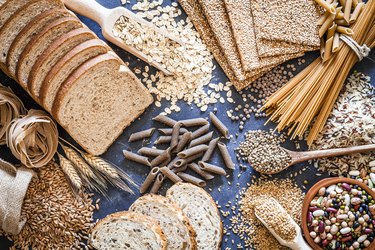
Carbs are a key part of a healthy diet, not to mention they're delicious! The carbs in your diet keep your cells and tissues — including your muscles — energized, and carbs also serve as the primary source of fuel for your brain. But while eating carbs is important, taking in too many can contribute to health problems, from short-term discomfort to long-term chronic disease.
Too Many Carbs, Too Many Calories
Video of the Day
Unfortunately, carbs' delicious taste and comforting texture comes at a caloric price. Each gram of carbs contains 4 calories, and some of your favorite carb-rich foods contain dozens of grams of carbs, which can add up to hundreds of calories. A cup of mashed potatoes, for example, has 237 calories, while a cup of whole-wheat macaroni contains 212 calories — and that's before you add in calories for toppings or sauces. Even healthy sources of carbs, like wheat tortillas, can be high in calories; an 8-inch tortilla has 146 calories.
Video of the Day
Read More: Importance of Carbohydrates
Calories aren't inherently bad; they actually provide energy you need to stay active. But eating too many calories can lead to weight gain because your body will store any extra energy as fat. So while you won't need to forgo carbs, you'll want to practice portion control with carb-heavy foods to avoid exceeding your calorie budget for the day.
Effect of Excess Carbs on Blood Sugar
Eating too many carbs might also negatively impact your blood sugar levels. Normally, blood sugar serves as a source of energy for your cells; your tissues can take up the sugar in your bloodstream and convert it into usable energy to fuel your active lifestyle. But refined carbs — sugar or "white" carbs like white bread and pasta — digest quickly and can cause a pronounced spike in your blood sugar levels. Your body responds by releasing hormones to lower your blood sugar levels but often ends up overcompensating and causing a blood sugar "crash" that leaves you feeling tired and hungry.
Read More: Is Eating Carbs REALLY Bad For Me?
Over time, eating too many carbs can negatively affect your ability to control your blood sugar levels. People who eat a higher glycemic index diet, i.e., one full of carb-rich foods that cause blood sugar spikes, face a higher risk of developing type-2 diabetes, according to the Harvard School of Public Health.
Your best option? Select healthy sources of carbs, like legumes, whole grains, fruits and vegetables, instead of processed and refined ones, like sweets or white pasta. Healthy carbs are less likely to spike your blood sugar, and they're better for preventing type-2 diabetes.
Health Risks of Excess Carbs
Eating a high-carb diet isn't necessarily bad, but you should avoid eating the wrong kinds of carbohydrates. Refined carbs, which include white flour and white bread, aren't as healthy as complex carbohydrates like vegetables and fruit.
Refined carbs are easier to digest and get into your bloodstream faster. Your body releases insulin to control the spike in blood sugar. Complex carbs take longer to digest which means that they don't cause your blood sugar to spike.
Over time, eating a diet high in refined carbohydrates can raise your LDL cholesterol levels, which increases your risk for heart disease. According to a 2017 study published in The Journal of Nutrition, replacing refined carbohydrates with eggs and unsaturated fats, which you can get from fish and nuts, lowered triglyceride and cholesterol levels.
How Much Is Too Much?
How much food, and how many carbs, you need daily depends on a few factors, including your age, metabolism and activity level. Generally, you'll want to get between 45 and 65 percent of your calories from carbohydrates which translates to 203 to 293 grams of carbs daily in an 1,800-calorie diet. If you're eating significantly more than that, you might miss out on essential protein and fat, which help maintain lean muscle and aid in nutrient absorption, respectively. Talk to a registered dietitian if you're struggling to follow a balanced diet. A dietitian can recommend a target carb intake personalized to your health and lifestyle, as well as supply a personalized meal plan to help you reach your goals.
- HealthAliciousNess: Nutrient Facts Comparison Tool (Mashed Potatoes, Macaroni, Tortilla)
- Harvard School of Public Health: Carbohydrates and Blood Sugar
- University of Michigan Health System: High Fiber Diet
- Indiana University: Drinking Healthy Beverages
- The Journal of Nutrition: Replacement of Refined Starches and Added Sugars with Egg Protein and Unsaturated Fats Increases Insulin Sensitivity and Lowers Triglycerides in Overweight or Obese Adults with Elevated Triglycerides